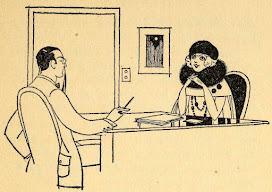Ask a Lawyer:
What to do When Your Literary Agent Stops Communicating With You?
Q: I can't stand my agent. She doesn't do anything, I mean anything. How do I get out of this contract?
A: If your agency agreement is for a set duration, your agent may have a claim if you terminate it before the contract expires.
 |
|
Illustration by Lauren Stout from Lawton Mackall’s Bizarre |
expires, your agent may have a valid claim to a commission if the deal arises post-termination. Make sure your agency agreement has a sunset clause. This heavily negotiated clause states that it's not commissionable if your agent doesn’t secure a contract within X days of expiration. Does the agency agreement require your agent to report to you writing where (and when) they sent your book proposal, who rejected it, and where it is still under consideration? Make sure it does. If they didn't submit it, they shouldn't take a commission.
Consult a publishing attorney before you fire your agent (or hire a new one). If you don’t, you could wind up paying double commissions. If you wish to leave your agent but stay with your publisher, complications may arise. Take the cross-collateralization clause. A cross-collateralization clause allows your publisher to recoup an outstanding advance from one book with the revenues from a later book. If you wish to stay with your existing publisher, you don't want royalties payable on your next book used to offset an unrecouped advance. Your options may be limited.
Just because you haven't signed an agency agreement, doesn't mean you aren't contractually bound to your agent. Most book publishing contracts contain an agency clause. To the surprise of many, it's not drafted by the publisher but inserted into the publishing agreement at the agent's request. The agency clause, which states the agent's commission, directs the publisher to pay all monies due you to the agent. The typical agency clause also gives the agent the power to make business decisions for you. Ideally, you will have signed an agency agreement, which, rather than the agency clause, controls.
The Takeaway
Don’t sign what you don’t understand -- whether it’s a literary agency agreement, film option, or publishing agreement. Hire a publishing attorney. They will point out the double dips and overreaches (does the agreement contain a "coupled with interest" clause?). Every game needs a referee. Even if you have an agent, you need a lawyer.
Don’t sign what you don’t understand -- whether it’s a literary agency agreement, film option, or publishing agreement. Hire a publishing attorney. They will point out the double dips and overreaches (does the agreement contain a "coupled with interest" clause?). Every game needs a referee. Even if you have an agent, you need a lawyer.
You can follow Lloyd Jassin on Twitter at www.twitter.com/lloydjassin
Disclaimer: This article is of a general nature and is not intended as legal advice. It does not create an attorney-client relationship or any other expectation or representation.
BIO
Lloyd J. Jassin is an attorney who focuses on publishing, entertainment, and intellectual property law. His professional career began in publishing, where he worked for Simon & Schuster, St. Martin's Press, and Macmillan. At S&S, he was Director of Publicity of the Prentice Hall Reference Group. Before forming his firm, he was an IP associate with Cowan, Liebowitz & Latman. Prior, he worked in television syndication / legal affairs at Viacom International. He is co-author of The Copyright Permission and Libel Handbook. You can contact him at jassin@copylaw.com, visit his blog at http://www.copylaw.org/.
Lloyd J. Jassin is an attorney who focuses on publishing, entertainment, and intellectual property law. His professional career began in publishing, where he worked for Simon & Schuster, St. Martin's Press, and Macmillan. At S&S, he was Director of Publicity of the Prentice Hall Reference Group. Before forming his firm, he was an IP associate with Cowan, Liebowitz & Latman. Prior, he worked in television syndication / legal affairs at Viacom International. He is co-author of The Copyright Permission and Libel Handbook. You can contact him at jassin@copylaw.com, visit his blog at http://www.copylaw.org/.
.
